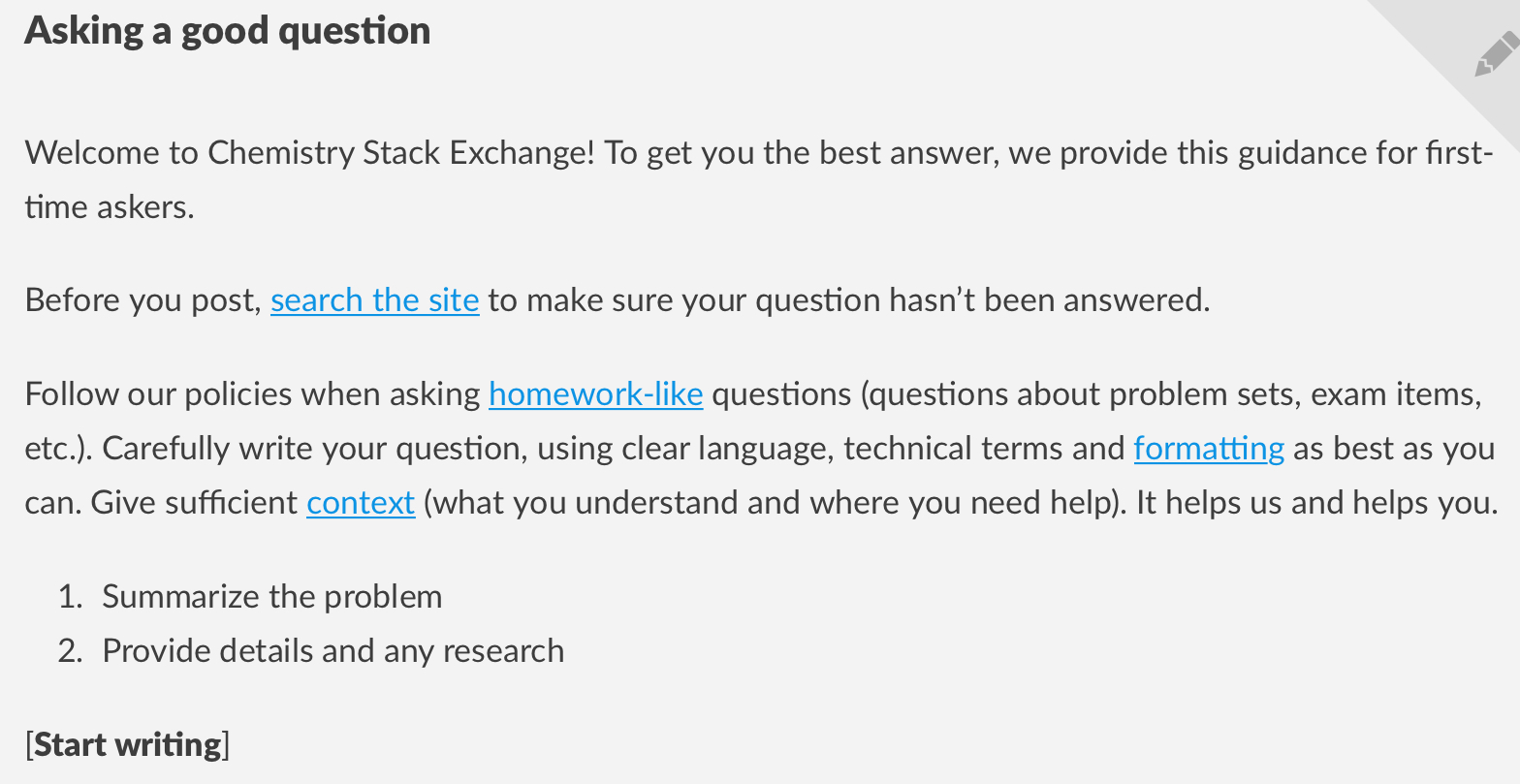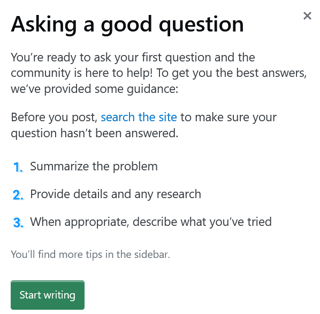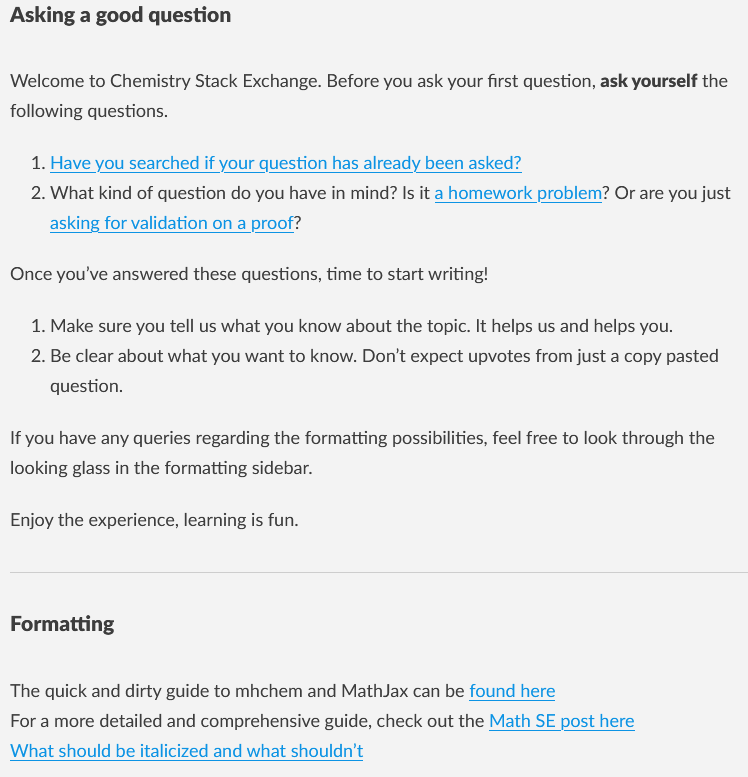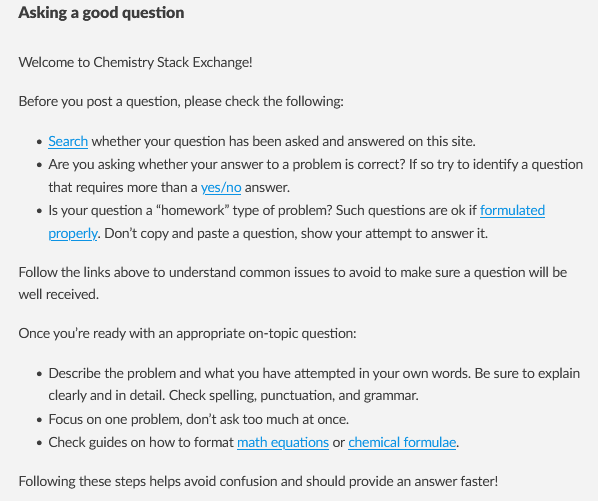Asking a good question
Welcome to Chemistry Stack Exchange! To get you the best answer, we provide this guidance for first-time askers.
Before you post, search the site to make sure your question hasn’t been answered.
Follow our policies when asking homework-like questions (questions about problem sets, exam items, etc.). Carefully write your question, using clear language, technical terms and formatting as best as you can. Give sufficient context (what you understand and where you need help). It helps us and helps you.
- Summarize the problem
- Provide details and any research
[Start writing]
Mockup

Rationale
Potential impact
About 40% of questions asks are first-time questions. In the last 90 days (as of 9/17/2022), 609 questions were closed, about half of all questions asked during that time. Better guidance could result in higher quality questions posted, and low-quality questions not posted (because the potential OP realizes that the question would be a duplicate or is off-topic or blatant homework). This might have a slight positive impact on the site (less work closing questions, more time for answering good questions or editing questions to turn them into good questions).
The bigger potential impact is on what happens to users after they ask their first question. If the OP's question gets closed, voted down or receives unflattering comments, this might be the last question the OP asks here. This is fine for OPs that have little or nothing to offer to the community, and are not interested in learning about how the site works. However, there might be one or two first-timers who would mature into valuable high-impact members of the community if their first question is of higher quality and gets received better (good answers, helpful comments, up-votes).
So while the impact on the quality of the questions might be minimal, there is an impact on retaining members of the community who learn how the site works and become valuable contributors of questions or answers. The way the community is structured (many users with little reputation, few users with high reputation answering a large fraction of questions), having just a few first-time question askers mature into experienced "regulars" would make a significant impact.
Addressing common weaknesses
The modal should address the most common weaknesses of questions asked. The four most common close reasons are lack of detail or clarity (45%), homework-like (33%), duplicate (10%) and lack of focus (5%). This is for the same 90-day period. Less common reasons to close are personal medical questions, migration to other site, opinion-based and other (all less then 3%).
The three points in the modal combined with the bold sentence at the end cover the four common close reasons, with links to relevant information on how to write good questions.
The first point addresses researching existing questions before posting. This reduces duplicates, allows the OP to learn about good questions by example, and ideally results in a higher quality question overall. It also could prevent some off-topic questions from being posted.
The second point encourages good writing. The formatting takes effort, something the community values. Good writing, especially combined with the research from point 1, makes the question easier to understand.
The third point helps to understand the question as well. If the OP does not know much chemistry and is confused about fundamental concepts, it is likely that the question will be confusing as well. Adding context, sources, and communicating the OP's thought process often makes it possible to give a meaningful answer even if the question still needs work.
Lastly, the bold sentence at the end addresses questions in the realm of cheating or letting others do your work. Those are questions that the community could do without unless the OP puts in some extra work and isolates the conceptual difficulties they would like some help with.
Format and length of the modal
To be effective, the modal should be short, and the links to more information should also serve as visual landmarks for skimming over it. This proposal has 5 links to sources of additional information. Ideally, OPs will skip over those that don't apply and look into those that do. Again, it is expected that many will ignore the guidance, but if a few get something out of it, these changes will have potential positive impact on the community.
Follow-up when OPs ignore the modal
Having a set of five relevant links allows efficient comments for questions that show promise but have basic problems. Linking to the topics that should be improved (to avoid down-votes, to get the question to be reopened, to write higher-quality questions in the future) would be straightforward and give OPs a second chance to read the guidance.




